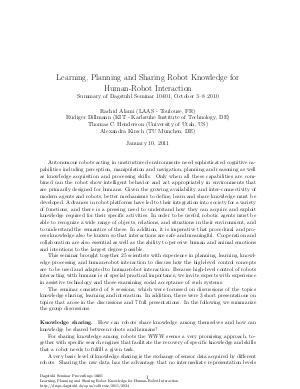10401 Summary – Learning, Planning and Sharing Robot Knowledge for Human-Robot Interaction
Authors Rachid Alami, Rüdiger Dillmann, Thomas C. Henderson, Alexandra Kirsch
-
Part of:
Volume:
Dagstuhl Seminar Proceedings, Volume 10401
Part of: Series: Dagstuhl Seminar Proceedings (DagSemProc) - License:
 Creative Commons Attribution 4.0 International license
Creative Commons Attribution 4.0 International license
- Publication Date: 2011-01-11
File

PDF
DagSemProc.10401.2.pdf
- Filesize: 166 kB
- 3 pages
Document Identifiers
Subject Classification
Keywords
- Human-robot interaction
- Robot knowledge representation and sharing
- Learning
- Planning
Metrics
- Access Statistics
-
Total Accesses (updated on a weekly basis)
0Document
0Metadata
Abstract
abilities including perception, manipulation and navigation, planning and reasoning as well as knowledge acquisition and processing skills. Only when all these capabilities are combined can the robot show intelligent behavior and act appropriately in environments that are primarily designed for humans. Given the growing availability and inter-connectivity of modern agents and robots, better mechanisms to define, learn and share knowledge must be developed. Advances in robot platforms have led to their integration into society for a variety of functions, and there is a pressing need to understand how they can acquire and exploit knowledge required for their specific activities. In order to be useful, robotic agents must be able to recognize a wide range of objects, relations, and situations in their environment, and to understand the semantics of these. In addition, it is imperative that procedural and process knowledge also be known so that interactions are safe and meaningful. Cooperation and collaboration are also essential as well as the ability to perceive human and animal emotions and intentions to the largest degree possible. This seminar brought together 25 scientists with experience in planning, learning, knowledge processing and human-robot interaction to discuss how the high-level control concepts are to be used and adapted to human-robot interaction. Because high-level control of robots interacting with humans is of special practical importance, we invite experts with experience in assistive technology and those examining social acceptance of such systems.
Cite As Get BibTex
Rachid Alami, Rüdiger Dillmann, Thomas C. Henderson, and Alexandra Kirsch. 10401 Summary – Learning, Planning and Sharing Robot Knowledge for Human-Robot Interaction. In Learning, Planning and Sharing Robot Knowledge for Human-Robot Interaction. Dagstuhl Seminar Proceedings, Volume 10401, pp. 1-3, Schloss Dagstuhl – Leibniz-Zentrum für Informatik (2011)
https://doi.org/10.4230/DagSemProc.10401.2
BibTex
@InProceedings{alami_et_al:DagSemProc.10401.2,
author = {Alami, Rachid and Dillmann, R\"{u}diger and Henderson, Thomas C. and Kirsch, Alexandra},
title = {{10401 Summary – Learning, Planning and Sharing Robot Knowledge for Human-Robot Interaction}},
booktitle = {Learning, Planning and Sharing Robot Knowledge for Human-Robot Interaction},
pages = {1--3},
series = {Dagstuhl Seminar Proceedings (DagSemProc)},
ISSN = {1862-4405},
year = {2011},
volume = {10401},
editor = {Rachid Alami and R\"{u}diger Dillmann and Thomas C. Henderson and Alexandra Kirsch},
publisher = {Schloss Dagstuhl -- Leibniz-Zentrum f{\"u}r Informatik},
address = {Dagstuhl, Germany},
URL = {https://drops.dagstuhl.de/entities/document/10.4230/DagSemProc.10401.2},
URN = {urn:nbn:de:0030-drops-29342},
doi = {10.4230/DagSemProc.10401.2},
annote = {Keywords: Human-robot interaction, Robot knowledge representation and sharing, Learning, Planning}
}
